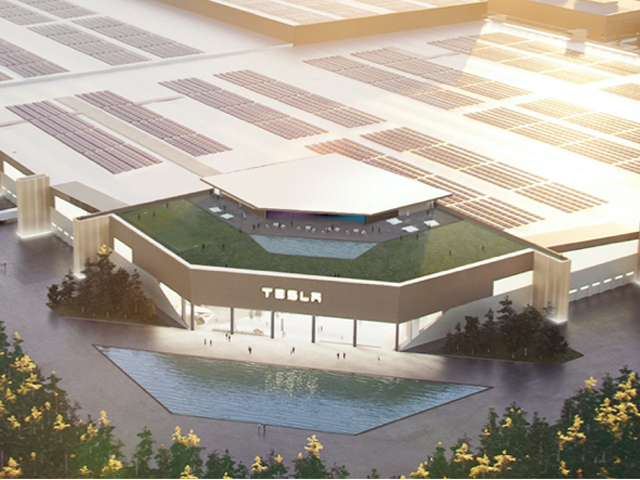
A gigafactory makes Germany’s public bodies face unprecedented challenges
Author: Katrin Müller
In November 2019, the CEO of the US electric automobile manufacturer Tesla, Elon Musk, announced plans of building a “Gigafactory” on the outskirts of Berlin, Germany – more precisely in Grunheide, Brandenburg. Since then, the construction project is being executed with incomparable speed, despite the current pandemic. But are the Brandenburg region and Tesla even a perfect fit? And who pulls the strings in the ongoing approval processes?
Jackpot for the Brandenburg region?
The fact that the local authority of the German region of Brandenburg was able to secure a deal with Tesla, one of the world’s most innovative companies, represents, without doubt, one of the biggest opportunities yet for the region. The astonishing investment volume of approximately 4 billion Euro that the automobile manufacturer brings, provides the former coal-mining region with a chance of transforming its image into an attractive location for auto-tech and tech industries. To account for the influx of an estimated 10.000 future employees and to create attractive living spaces, Brandenburg’s Ministry of Infrastructure has already shown its willingness to expand the region’s school and nursery offers. On a larger scale, the construction of one of Tesla’s Gigafactories in Germany might be an important step toward a greener German economy and society, as Tesla is seen as being able to match the predominant market trend of reducing global warming and knows how to market it well. However, the project also represents a great risk for the area, as Brandenburg is known for its water scarcity and the construction site is situated on a drinking water protection zone. Residents, therefore, fear that harmful substances might contaminate drinking water or that the water used by the factory will lead to an increased shortage. As for Tesla, the location of Grunheide brings many advantages such as the proximity of motorways, railway tracks and Berlin’s new airport BER. Moreover, the site is already an industrial park which means fewer bureaucratic hurdles.
Germany’s national context of automobile technologies
Germany is known to be home to some of the biggest car manufacturers worldwide, such as Volkswagen, Mercedes or Audi. Supporting the national brands and placing trust in its engineering capabilities, the majority of Germans are still heavily reliant on and looking for fossil fuel technologies in their vehicles. As a matter of fact, the whole automobile industry is locked into its current way of doing things, as manufacturers are able to achieve scale economies, have a particularly strong lobbying position and society has not yet adapted its expectations towards the motored vehicle. More precisely, people are used to driving long distances with their car and rely on a well-developed infrastructure of petrol stations to refuel. This system lock-in is impeding innovation of and investment in other automotive technologies that are potentially superior or more sustainable. Tesla’s entry into the German market could create the necessary competition for German car manufacturers and could provide disruptive innovation approaches to achieve Germany’s objective of becoming the world’s largest market and provider of e-mobility. Furthermore, Tesla’s stand-alone efforts of enhancing the national electrical charging infrastructure might facilitate the market introduction of other brand’s electric vehicles. However, one must not disregard that the national government itself has already invested considerably in electric infrastructure for trucks, such as an electric highway-lane for trucks near Frankfurt.
The chances of becoming an auto-tech region
One substantial influencing factor in auto-tech innovator Tesla’s location decisions is the surrounding innovation landscape. The German capital Berlin has proven itself to be very attractive in that regard, as the city brings together multinational talent and an advanced tech ecosystem. Even though the new Gigafactory will be situated in the region of Brandenburg, its geographical proximity to Berlin will create opportunities for knowledge exchange and interactive learning. Another possible factor facilitating the building of a regional innovation system is the high customization of regional innovation policies, regional governance structures and higher resources for each region due to Germany’s federalist form of governance. The high competencies of regional governments in detecting potential opportunities and challenges in one’s region could even open the door for the development of a Brandenburg industry specialization. Having said that, one should also acknowledge that the entry of an auto tech giant such as Tesla will in any case change existing local governance structures and that the considerable investment which the region will from now rely on, will give Tesla increasing power in policy implementation and governance processes. Further, it is still unclear if Tesla can do justice to their announcement of a possible production expansion of up to two million cars yearly that will most likely be necessary to create sufficient synergies for the setup of a whole new regional innovation system. There is also the question whether Berlin and the Brandenburg area can even be lumped together into one system.
Brandenburg VS. Tesla – A Clash of Cultures?
Tesla received anything but a warm welcome from some citizens of Grunheide, Brandenburg. Besides environmental concerns such as the possible increase in water scarcity and deforestation, the Gigafactory’s opponents are mainly accusing Tesla and the regional government of lacking transparency and lacking public participation possibilities. It seems like the sparsely populated recreation area Brandenburg and the auto-tech firm Tesla are just not a great fit. Nonetheless, for the region to expand its innovation and network-building potential, social engagement and human progress within the region are truly necessary. To foster this, Tesla established a point of contact for concerned citizens directly in Grunheide. Furthermore, the prospect of a revitalization of Brandenburg’s economic and cultural landscape causes the majority of its citizens to promote the further integration of Tesla.
Public Engagement in the Future of Mobility
The responsibility for the successful integration of Tesla into the Brandenburg region and the governance of Tesla’s planned initiatives lies with the regional government of Brandenburg. In the first place, the public authority should enable public participation and ensure that citizen’s concerns are heard. This will allow for a greater acceptance of Tesla’s technologies in society, which is of the utmost importance, as technological innovation is always dependent on the simultaneous advancement of society. In this case, for instance, the societal advancement might be an increased individual focus of the population on the realisation of climate targets. Also beneficial is the increased engagement of public authorities in the country’s future of mobility. The Brandenburg regional government should therefore pay attention to retaining control over project audit and the provision of public goods, while also creating incentives for the settlement of other innovative companies in the region. In the national context the same weighting applies, as innovative technologies for automobiles need to be funded and novel policy approaches need to be developed, while also limiting the power of the already strong automotive lobby. Which type of technology provided by which company is the most appropriate for which region must be constantly evaluated and the decision must be made by public authorities, society and private firms equally.
 Katrin Müller was exploring contemporary challenges for innovation and society as part of her exchange term at the Alliance Manchester Business School. She is spending the rest of her Master’s degree studying Accounting & Taxation at the University of Cologne, Germany.
Katrin Müller was exploring contemporary challenges for innovation and society as part of her exchange term at the Alliance Manchester Business School. She is spending the rest of her Master’s degree studying Accounting & Taxation at the University of Cologne, Germany.
An earlier version of this blog was prepared for BMAN61001 Entrepreneurship, Technology and Society, Alliance Manchester Business School, The University of Manchester.
Feature image: © tesla.com

0 Comments